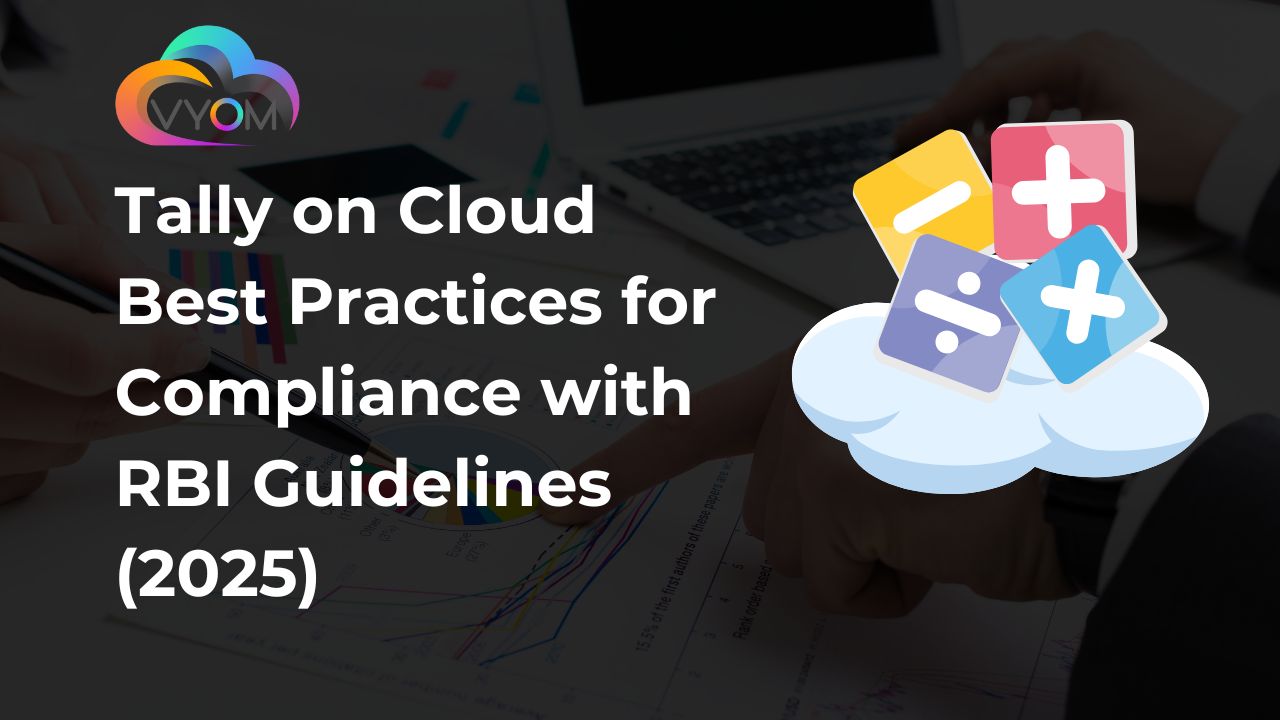Tally on Cloud Best Practices & RBI Guidelines
Tally on Cloud: Best Practices for Compliance with RBI Guidelines (2025)
Tally, which was a desktop-only solution before, is now available through the cloud, making it easier for businesses to use it remotely and enjoy better security for their data. It is very important to align your Tally on Cloud installation with the guidelines created by RBI for compliance, strong security, and to make sure the business can carry on as usual. VyomCloud is here to tell you more about the best ways to work on Tally on Cloud, the RBI’s cloud initiatives, and the answers to some usual questions.
Why Should Businesses Migrate Tally to the Cloud?
- Remote Access gives you the ability to use Tally on any device from any place, making work simpler and the company functional in any emergency.
- Eliminate the costs of owning your servers, reduce the expenses for managing them, and pay just for what you require.
- It’s easy to adjust your system to fit your business goals without making big investments beforehand.
- Professional security features, frequent backups, and ways to recover from disasters are provided by reliable cloud services.
- Several people can make adjustments to the same data all at once, which boosts teamwork and efficiency.
Top Guidelines for Using Tally on Cloud
Cloud SaaS Service from a Trusted Company
- Pick an agency that has gained a good reputation for security, complying with regulations, and dealing with customers’ needs.
- Ensure that the provider is certified with ISO 27001, SOC 2, and follows the requirements of GDPR for the safety of your data.
Tough Security Systems
- Encryption of data should be used to secure it when it moves and when it is stored.
- Use three measures – role-based access control, multi-factor authentication, and strong password regulations to limit access for authorized individuals.
- Place firewalls, use IDS and IPS systems, and offer VPN access security to prevent cyber risks in your Tally environment.
Regular Backup and Disaster Recovery
- Arrange regular backups to be done automatically and test your disaster recovery plan often.
- Because of this, it is possible to quickly retrieve your data in the event of broken devices, attacks by hackers, or disasters.
Monitor and Audit Access
- Look at user logs and access records from time to time to find out if anyone is doing something suspicious.
- When issues are spotted early, they may be handled before they become serious.
Make Sure Your Software Is Up-to-Date
- Always update the software, operating system, and security patches to stop known risks.
Improve Cost and System Efficiency
- Because the user load and data volume vary from company to company, set up servers according to their requirements.
- Use auto scaling to manage the application when it becomes very busy.
- With the help of these tools, make sure to keep track of your cloud resources and waste minimal money.
Ensure Compliance
- Regularly review the RBI and other laws regarding how your company should handle and process data. Cooperate with outsourcing companies that have an understanding of Indian laws related to finance.
Cloud Initiatives and Guidelines Set Up by the RBI
RBI’s Aim for the Future of Cloud in Banking
Under the name of its cloud platform, the RBI is taking a lead in updating India’s financial data management by concentrating on smaller banks and financial organizations. The initiative has the objective to –
- RBI wants to guard the financial sector’s data by providing a secure, centralized platform for storage.
- Efforts to use local data storage solutions match with India’s data security practices and its digital sovereignty goals.
- The RBI cloud will help financial companies expand easily and continue their work without interruptions.
Important Rules Set by the RBI for Using Cloud Technology
- Financial institutions should keep data confidential, intact, and easily accessible when they use cloud solutions. The provider should encrypt data seriously, use various access controls, and conduct routine security audits.
- In order to comply with the Data Protection Act and RBI’s directive, financial data needs to be kept and used within India.
- Before cooperating with cloud service providers, banks need to make sure they are RBI-compliant and are carefully checked during the selection process.
- When using the cloud, having a disaster recovery and business continuity plan is important to prevent losing services and data for a long period.
- Regulations require institutions to store their data on the cloud to allow audits and inspections by the authorities.
What Does the RBI Bring to the Cloud?
- Pilot Launch in 2025 – In the first stage, the pilot program in 2025 will help to prepare for the full launch of RBI’s cloud platform by collecting users’ feedback.
- Operated by IFTAS – Initially managed by Indian Financial Technology & Allied Services (IFTAS), the facility will eventually be transferred to a consortium of financial sector participants.
- Focus on Security and Scalability – Security and scaling will be important features of the services offered, guaranteeing that any type of cloud service can be used safely and efficiently.
Setting Up Tally on Cloud in Steps
- Pick from Vyom’s Cloud Tally on Cloud Plans.
- Put Windows on your cloud server. Tally needs Windows to run well.
- Use the instructions given by your cloud server provider to download and set up Tally.
- Check your network’s security by arranging firewalls, applying encryption, and setting up MFA, RDP, and VPN access.
- Set up the number of CPUs, RAM, and storage that is needed for your database based on how many users are active and how much data there is.
- Assign fixed IPs and apply security protocols to ensure a smooth connection.
- Automate the backup process regularly so that saving important data is always possible.
- Cloud monitoring tools help to check the system’s condition and optimize the usage of resources.
Frequently Asked Questions (FAQs)
- What are the top benefits you get when you use Tally on the Cloud?
Tally on Cloud makes it possible to work from anywhere, enjoy higher security, save expenses, adapt to changes, and bring users closer together.
- Is my Tally database on the cloud protected from attacks?
Your security is determined by who you use to host your website and how you set it up. The best security practices are encryption, access controls, taking regular backups, and selecting a compliant provider.
- Which RBI rules do I have to follow when using Tally on Cloud?
Comply with the RBI rules on security measures, data storage, working with outside providers, business reliability, and officially reporting.
- Can I make use of Tally on Cloud by accessing it from my mobile phone?
You are able to work with Tally on your mobile using Remote Desktop Protocol (RDP) applications.
- How should I guarantee that my firm adheres to local data storage rules?
Opt for a cloud service provider that has data centers inside India and ensure they are in line with the laws of the RBI and the Data Protection Act.
- What is the RBI planning for the cloud, and how will it be part of my company operations?
RBI is introducing a cloud platform made in India that guarantees security and helps banks save costs, also supporting digital transformation.
- Which aspects of Tally cloud hosting are most important to look for?
Ensure that the vendor’s certifications are suitable, support for data can be localized if needed, services are expandable, and past experience.
- Should I set up Tally to store my data on the cloud automatically?
Set your system to do backups daily and ensure you check your disaster recovery regularly.
- Is it possible for several users to modify Tally data on the cloud at the same time?
Certainly, with Tally on Cloud, several users can access the data in real-time for enhanced teamwork and greater productivity.
- How do I move Tally information from my local computer to the cloud?
In cooperation with your cloud service provider, move your data safely, establish the cloud settings, and make sure everything is working well before you make it live.
Conclusion
Indian companies are now benefiting from improved control of their accounting and finances through Tally on Cloud, thanks to the great flexibility, high security, and efficiency it provides. By using the right cloud supplier, protecting your information using strong security, complying with the rules, and keeping yourself informed about RBI guidelines, you can make good use of cloud technology and keep your company’s data safe at the same time.
When the RBI adopts its cloud platform, both rules and protection of financial information may see noticeable improvements. Be active, meet all standards, and let the VyomCloud assist your business growth!
Read More : 5 Real-World Business Use Cases with Tally on Cloud
Let’s Get Social:
Facebook: https://www.facebook.com/vyomcloudnetwork/
LinkedIn: https://www.linkedin.com/company/vyomcloud/
Instagram: https://www.instagram.com/vyomcloud/

